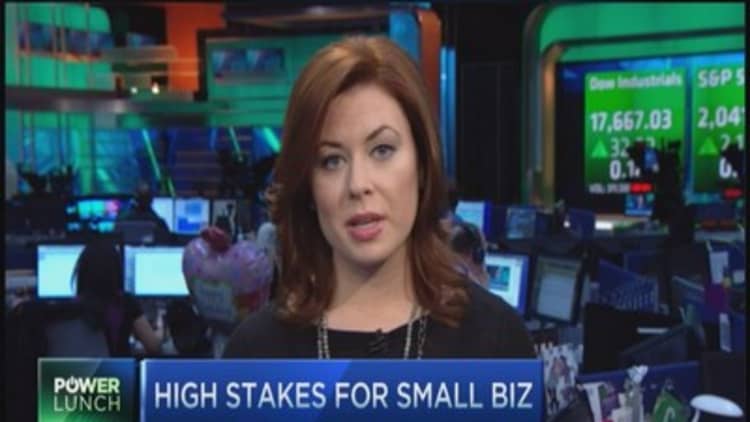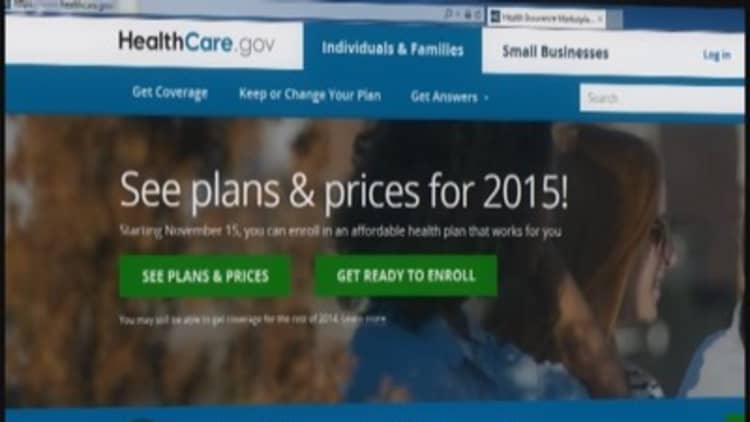
While small business owners may have steered clear of Obamacare's regulations and penalties in year one of the president's landmark health-care legislation, the Affordable Care Act, they won't be so lucky this time around.
Open enrollment period officially kicked off on Saturday, and small companies with at least 100 or more full-time workers now have big decisions to make. They have to offer employees government-approved health insurance, or face a penalty of $2,000 per worker, per year. Full-time workers are defined as those that work 30 hours or more a week.
Such potential costs are weighing heavily on small business owners. Payroll processing firm ADP has conducted a survey over three years, and health-care costs and worries have consistently ranked as a top-three problem for these companies.
Read More Obamacare's very small business exchange enrollment
Those businesses with between 50 and 999 employees this year said the top two concerns were the cost of health coverage and other benefits, followed by health-care complexities, according to the ADP survey.
The third concern cited was the level and volume of government regulations, according to the survey.
Entrepreneurs run over by red tape
ADP research also found that to address health-care regulations, 32 percent of small companies reduced their number of medical plan options, 29 percent capped part-time hours, and 25 percent reduced the number of insurance options offered.
"The level of concern is consistent for these business owners, and it's not going away," said Michael Schneider, vice president of ADP's corporate marketing.
And being an entrepreneur can be complicated, and costly.
Schneider says one-third of business owners are fined annually for not complying with some form of government regulation. Plus, half of those fined don't even know the details of the fines they're paying, according to ADP data.
"The level of regulations coming at them—it's tough to manage and keep up with that complexity," says Schneider of ADP.
Read MoreWhy Main Street isn't creating jobs
So far, small business health-care enrollment isn't looking promising, according to a recently released Government Accountability Office report.
As of last summer, only 76,000 people working for 12,000 employers had enrolled in plans on state-run Small Business Health Options, or SHOP, exchanges. That's well short of enrollment projections of 2 million enrollees in 2015.
Data for the 33 states operating on the federally run SHOP exchange was not yet available, but is expected to be consistent.

Small businesses overall "aren't clamoring for access to a SHOP exchange," said Tom Harte, president of the National Association of Health Underwriters, a group that represents licensed health insurance agents, brokers, consultants and benefit professionals.
Under the law, employers do not have to use the exchanges, but those at or over the worker number threshold must comply with health-care rules or pay up.
"The vibe right now is that small employers are shopping for insurance and considering their options," said Harte of the association.
However, Obamacare supporters argue health-care rules will help level the playing field and not penalize employers who do offer health-care coverage.
Micro businesses
Micro businesses (those with fewer than 20 workers) will probably send their workers to the individual exchange, Healthcare.gov, to shop for insurance and potentially receive tax breaks if they fall under a certain income threshold.
Sticker shock for health insurance, however, is still prevalent, says Harte, also president of Landmark Benefits, a New Hampshire-based benefits broker serving the New England area.
Plan premiums, meanwhile, continue to rise. "It's just as bad as it was last year. We had a lot of employers moving to a $3,000 deductible, but now we have seen more employers move to a $4,500 deductible than ever before," Harte said.
And given the potential costs to comply with health rules, small employers may opt to pay the $2,000 penalty rather than offer insurance.


